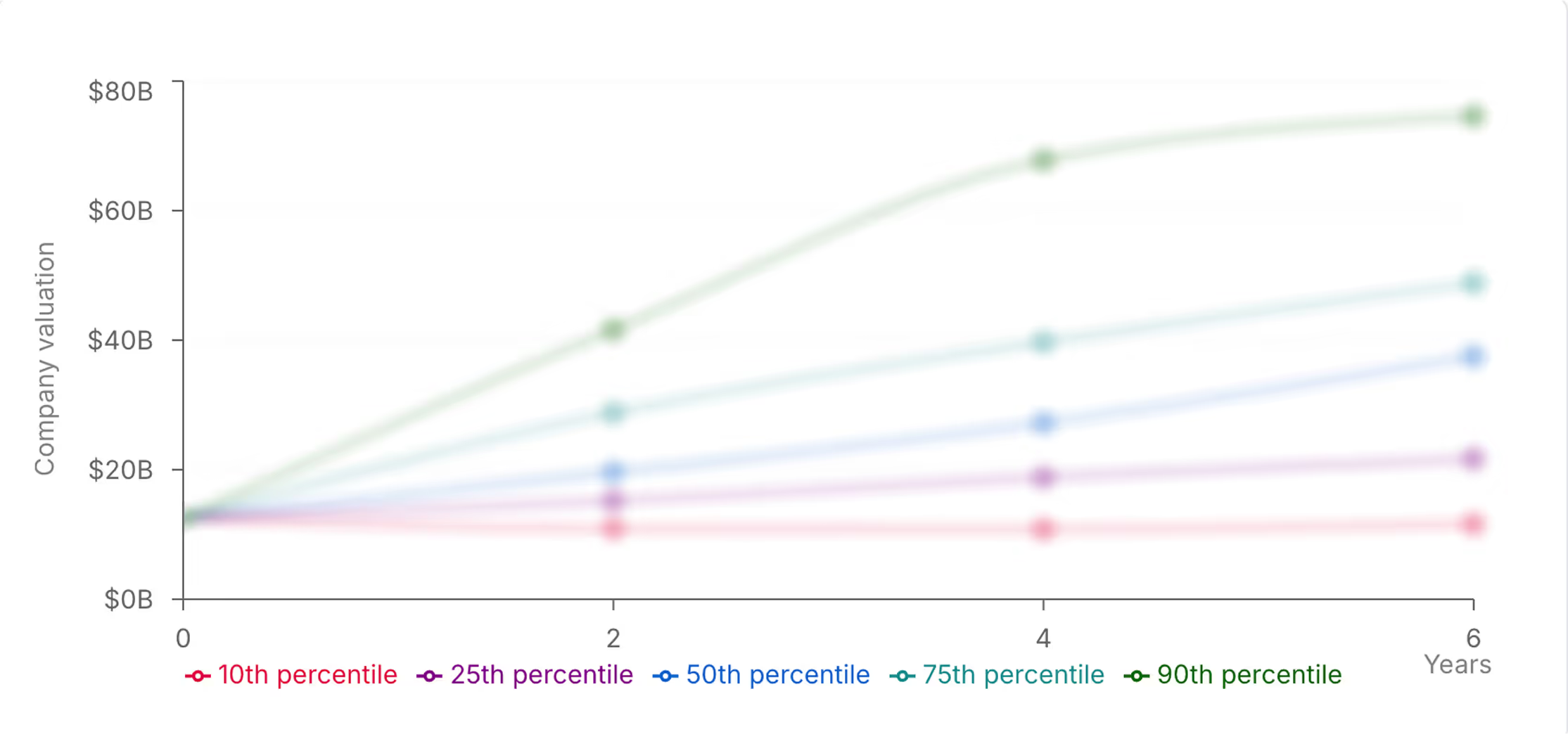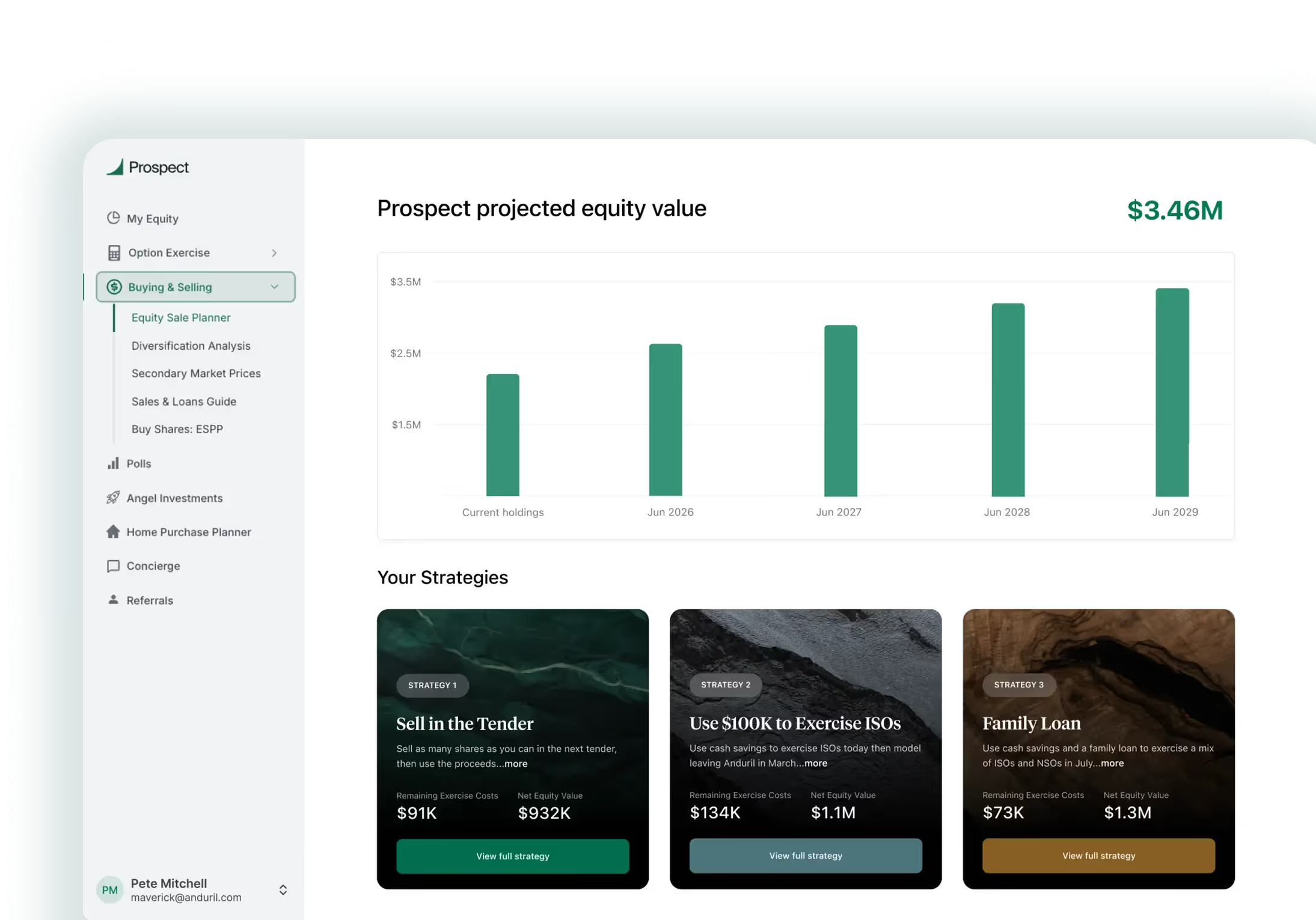
Mercury Financial
Mercury is a financial technology company providing a banking stack for over 200,000 startups, with FDIC-insured accounts and API access.
Secondary Market Price
How Mercury Measures Up
To help you manage your Mercury equity, Prospect has run the company through our machine learning model.
Prospect Rating
3x
Our rating projects that Mercury will be worth at least three times its current value in four years. For an employee with equity, this rating signals a strong potential for their stock options to increase in value.
Exit Risk
Very Low Risk
Our “Very Low Risk” rating for Mercury reflects that it is a profitable, fast-scaling category leader backed by top investors, giving it a much lower likelihood of failing to reach a liquidity event compared to other startups.
Funding Stage
Series C
Since Mercury is at the Series C stage, it has a proven business model and is focused on scaling, which translates to more stability for you as an employee. You'd be joining a mature startup that offers a balance of significant growth potential and reduced risk.
Secondary Market Price Chart
Secondary market prices shown here are a limited preview. Create a free account to access real-time secondary market prices.
Sign up to Unlock the Latest DataData will be available soon.
Sign up to receive notifications when it is available.

Prospect Projected Future Mercury Prices
Prospect’s machine learning model has been trained on the same data top-tier investors use to project the likely range of outcomes for Mercury's equity. Create a free account to view 10th-90th percentile projections over 2, 4, and 6 years.

Powerful tools to earn more from your equity

Company Description
Mercury is a financial technology company that provides a comprehensive banking stack designed for startups and tech-focused businesses. It currently serves over 200,000 companies with services that include FDIC-insured business accounts, corporate credit cards, domestic and international wire transfers, and API access for custom financial automation. While not a bank itself, Mercury delivers its services through partnerships with established, FDIC-member institutions. The company was founded in 2017 in San Francisco by Immad Akhund, Jason Zhang, and Max Tagher, a team that had previously built and sold the mobile ad network Heyzap.
The company has demonstrated significant momentum and resilience, notably gaining over $2 billion in deposits within days following the collapse of Silicon Valley Bank in March 2023. In response, Mercury launched its Vault product, expanding FDIC insurance coverage for customers. Investor confidence remains high, evidenced by a $300 million Series C funding round in March 2025. Looking toward the future of finance, Mercury is also a design partner in the development of Tempo, a payments-first blockchain incubated by Stripe, which aims to innovate global payments using stablecoins.
- Andreessen Horowitz
- Sequoia Capital
- Coatue
- Sapphire Ventures
- Charles River Ventures
- Dylan Field
- Scott Belsky
- Kevin Durant
- Ryan Petersen
- Kevin Hartz
- Andre Iguodala
- Co-Founder, CEO Immad Akhund
- Co-Founder, CTO Max Tagher
- Co-Founder, COO Jason Zhang
Frequently Asked Questions
Joining Anduril as an employee is another way to acquire equity, typically through stock options included in compensation packages.
Is Mercury worth joining?
Mercury exhibits strong fundamentals as a profitable, fast-growing company backed by top-tier investors like Andreessen Horowitz. To determine if it's the right fit for you, platforms like Prospect provide data-driven tools to evaluate your potential equity and compare the opportunity against other leading startups.
What should I do with my Mercury stock?
Managing private stock involves complex decisions regarding exercising options, tax implications, and timing potential sales. Resources such as Prospect offer tools for tax optimization and scenario modeling to help you make informed decisions and maximize your equity's post-tax value.
Can you sell Mercury stock?
As Mercury is a private company, its stock is not traded on public exchanges and is generally considered illiquid. While selling opportunities are limited, they can sometimes occur on secondary markets, and platforms like Prospect provide data on secondary pricing to help shareholders understand potential options.
How can I find the value of my Mercury stock?
A baseline for your stock's value can be derived from Mercury's latest private valuation of $3.5 billion. For a more personalized analysis, Prospect's equity tools can help you project the potential worth of your specific holdings using comprehensive market data and predictive models.
What is Mercury's equity worth?
The company's most recent funding round valued its total equity at $3.5 billion. To understand what an individual equity grant is worth, Prospect offers independent projections by analyzing company data with the same models used by top venture capitalists.
What is Mercury's stock ticker symbol?
Mercury is a privately held company, so its shares are not traded on a public stock exchange. Therefore, it does not have a stock ticker symbol.
Can I buy or sell Mercury stock?
Since Mercury is a private company, its stock is not available for purchase or sale on public markets. While direct trading is not possible, platforms like Prospect can provide insights into secondary markets where private shares are sometimes traded.
What is the criteria to buy or invest in Mercury stock?
Investing in a private company like Mercury is generally limited to accredited investors and venture capital firms that participate in funding rounds. These investors assess factors such as profitability, revenue growth, and market leadership, all of which are detailed on Mercury's Prospect profile.


